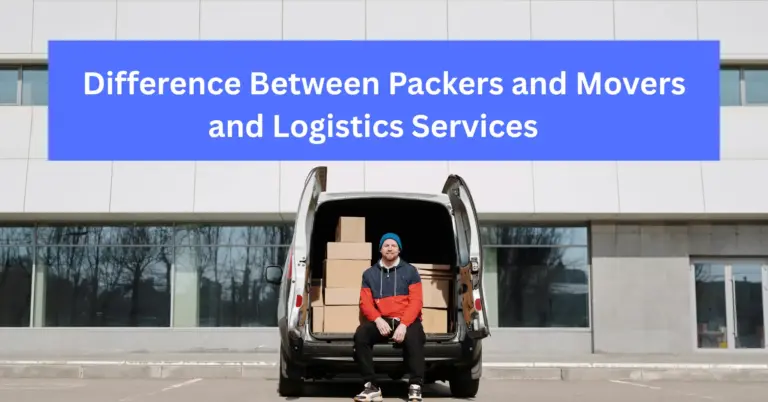
You must have heard of Packers and Movers and Logistics Services, but can you differentiate between these two? Do they serve distinct purposes and cater to different needs? The appropriate understanding between them can help fulfil your business and household requirements if you choose the right service provider for your specific needs. This blog will discuss the core differentiation between movers and logistics services.
Definition and Differentiation
The Packers and Movers relocate household items, manufactured goods, raw materials, office assets, and vehicle transportation. Their significant role is to support individuals and businesses in shifting their belongings safely and conveniently. These services include packing, loading, transportation, and rearranging your goods at a new destination.
On the other hand, logistics manages the manufactured goods, materials, and inventory from one point to another. This industry caters to manufacturers, retailers, and businesses that require supply chain solutions, including warehousing, inventory management, freight forwarding, and distribution.
Target Audience
Individuals, families, and small businesses are the primary clients of Packers and Movers. Whether you shift to a new city, or an office, packers and movers support you throughout the journey.
On the contrary, logistics services cater for manufacturing, e-commerce, retail, pharmaceuticals, and supply chain management businesses. Big giants rely on logistics providers to transport raw materials, finished products, and bulk consignments.
Services Offered
For Packers and Movers:
- Household relocation
- Office shifting
- Vehicle transportation (cars and bikes)
- Packing and unpacking services
- Loading and unloading
- Temporary storage solutions
- Insurance for household/ office goods
For Logistics Relocation:
- Freight transportation (road, rail, air, and sea)
- Warehousing and storage
- Inventory management
- Supply chain management
- Freight forwarding
- Cold storage solutions
- Customs clearance and documentation
Type of Goods Handled
Packers and movers handle personal belongings, furniture, appliances, vehicles, and office equipment. The team focuses on the safe and secure movement of items typically of sentimental or functional value to individuals.
Logistics companies deal with bulk goods, raw materials, perishable items, industrial equipment, and commercial shipments. The goods are often transported in large volumes and require specialized handling, tracking, and compliance with industry regulations.
Transportation Modes
Packers and Movers primarily rely on road transportation using big trucks and carriers designed for household and office relocations. They might also use trains or air freight for long-distance state moves.
Logistics Services use multiple transportation modes, including road, rail, air, and sea freight, depending on the relocation requirement of goods and destination. Logistics providers have networks that ensure efficient movement across borders and long distances.
Packaging Standards
Packers and Movers use bubble wrap, cardboard boxes, wooden crates, and cushioned packing that protect fragile and other household items. The packers and movers ensure the safety of individual belongings.
Logistics Services follow industrial-grade packaging standards using pallets, containers, shrink wrapping, and temperature-controlled packaging to ensure the safety of bulk goods. Logistics packing focuses more on efficiency and protection during long-haul transportation.
Pricing Structure
For Packers and Movers, pricing depends on factors such as the volume of goods, distance, type of service (full-service or self-packing), and additional services like insurance or storage. The cost quotation is according to the given parameters.
The pricing in logistics is more complex and depends on weight, volume, transportation mode, fuel charges, customs duties, storage duration, and handling fees. The pricing structure is often calculated per shipment or contract-based for long-term partnerships.
Tracking and Technology
Packers and movers provide tracking services through GPS-enabled trucks that allow customers to monitor their shipments. However, their tracking systems are relatively simple compared to logistics companies.
Logistics services offer top-notch tracking technology, including RFID tags, MIS, GPS trackers, IoT sensors, and AI-driven supply chain management systems. With the help of this, businesses can track inventory movement, optimize routes, and predict delivery timelines precisely.
Regulatory Compliance
Packers and movers follow basic transportation and insurance regulations related to household shifting. Their compliance requirements are relatively simple and focus on consumer protection laws.
Logistics providers must adhere to stringent industry regulations, including customs clearance, international trade laws, hazardous materials handling, and safety compliance. Documentation and compliance management are critical aspects of logistics operations.
Business vs Individual Needs
Ideal for individuals and small businesses requiring occasional shifting and relocation services. The focus is on providing a stress-free moving experience with minimal disruption to personal or work life.
Logistics work for businesses managing supply chains, distribution networks, and bulk transportation. Logistics providers work as long-term partners to ensure seamless supply chain operations.
Conclusion
Both Packers and Movers and Logistics Services involve the handling of goods, their purpose, target audience, and operational processes differ significantly. Packers and Movers specializes in household and office relocations, providing personalized and secure moving solutions. Logistics services, on the other hand, cater to businesses and industries, ensuring efficient supply chain management and large-scale transportation.
Understanding these distinctions helps individuals and companies make firm decisions when choosing the right service provider. If you are planning a personal move or need a logistics partner for your business, selecting the service will ensure efficiency, safety, and cost-effectiveness while relocating your goods.







